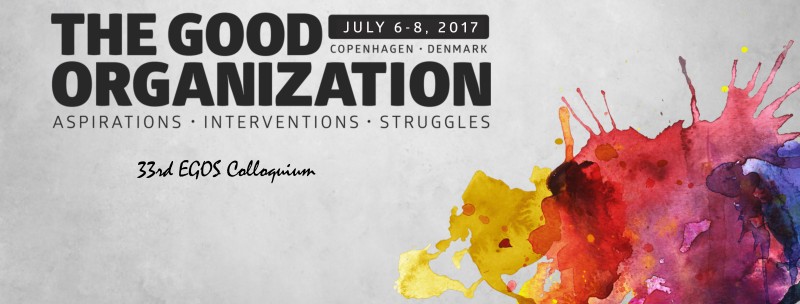PDW 07: Writing Theory Papers for the Academy of Management Review and Organization Studies
Call for Applications
Facilitators:
Depending on the number of applications, we will put together a team of facilitators,
including associate and senior editors of both journals and editorial board members.
Purpose
Both AMR
and Organization Studies aim to publish well crafted theory papers that galvanize our field. Such papers are crucially
important within our academic “ecosystem” of management and organization journals, where they foster new ways of thinking
and (re)direct lines of research.
However, developing and writing such conceptual papers is far from easy.
Oftentimes, prospective authors perceive writing theory as much more difficult than writing empirical, methods-driven papers.
This is partly the case as they often also have had little training in developing and writing theory, and lacking such practice
consider writing theory as risky (Byron & Thatcher, 2015). There are also no straightforward formulas or templates for
writing theory papers (Ragins, 2012).
To make matters even worse, there are also different styles, or genres,
of theory papers (Delbridge & Fiss, 2013), based on whether the main arguments are configured into a set of propositions,
a process model, a theoretical essay, or are presented as part of a comprehensive typology (Cornelissen, 2017). There is then
furthermore a lot that typically remains unsaid or is left implicit about what journals such as AMR and Organization
Studies expect from a theory paper, something that must be particularly challenging and mystifying to authors who are
attempting to write their first theory piece (Rindova, 2008).
The purpose of this PDW is therefore to help
participants understand
the specific expectations regarding a theoretical contribution for AMR and OS, and building on those expectations;
help them gain a good grasp of the different ways in which theory papers for these two journals can be written.
The first part of this PDW (9:00–10:15)
features a plenary session on both journals and a short roundtable discussion of common issues and expectations regarding
theory.
We will then in the second part (10:30–13:00) divide into roundtable groups where participants will
get feedback on their own paper from an associate or senior editor of both journals.
The rationale for this
PDW is that there are few workshops on theory papers. Both journals have “Meet the Editors” sessions. AMR also organizes
a general writing workshop at the AoM each year (which is heavily oversubscribed), but that workshop focuses mostly on general
writing issues. There is demand, we think, for a more hands-on paper development workshop. For both journals, EGOS offers
an important community of theory-minded scholars who are generally interested in writing for both journals and who would like
to get actionable feedback and help on how they might develop or strengthen their theory papers.
Application
We
invite authors to submit theory papers to be considered for this workshop. Please note that empirical papers will NOT be accepted.
In addition, papers that are accepted for presentation at the main Colloquium should not be submitted to this PDW – which
mainly targets early career researchers and doctoral students, but is also open to more experienced scholars. We particularly
encourage scholars who have not yet written theory papers for AMR and OS to apply. Everyone interested
in this workshop is invited to apply; however, priority will be given to scholars in earlier stages of their careers.
Please submit – via the EGOS website! – a single document (.doc, .docx or .pdf file) that contains the following
information:
On the cover page: a short letter of application containing full details of name, contact (i.e., postal address, phone, and email), affiliation, date of PhD completion (if applicable, stage in the doctoral studies otherwise);
A statement of why the applicant considers it valuable to attend the PDW, and an indication of what journal(s) the paper is likely to be submitted to;
A paper – 20–25 pages, double-spaced, not including references and/or tables – that you wish to further develop to a publishable stage and that you will bring to the PDW.
References
Byron, K., & Thatcher, S.M.B. (2016): “Editors’ Comments: What I Know Now That I Wish I Knew Then’ – Teaching Theory and Theory Building.” Academy of Management Review, 41, 1–8.
Cornelissen, J.P. (2017): “Editors’ Comments: Developing propositions, a process model or typology? The challenges of writing theory without a boilerplate.” Academy of Management Review, in press.
Delbridge, R., & Fiss, P.C. (2013): “Styles of theorizing and the social organization of knowledge.” Academy of Management Review, 38, 325–331.
Ragins, B.R. (2012): “Reflections on the craft of clear writing.” Academy of Management Review, 37, 493–501.
Ragins, B.R. (2015): “Editor’s Comments: Developing our authors.” Academy of Management Review, 40, 1–8.
Rindova, V.P. (2008): “Editor’s Comments: Publishing Theory When You Are New to the Game.” Academy of Management Review, 33, 300–303.


